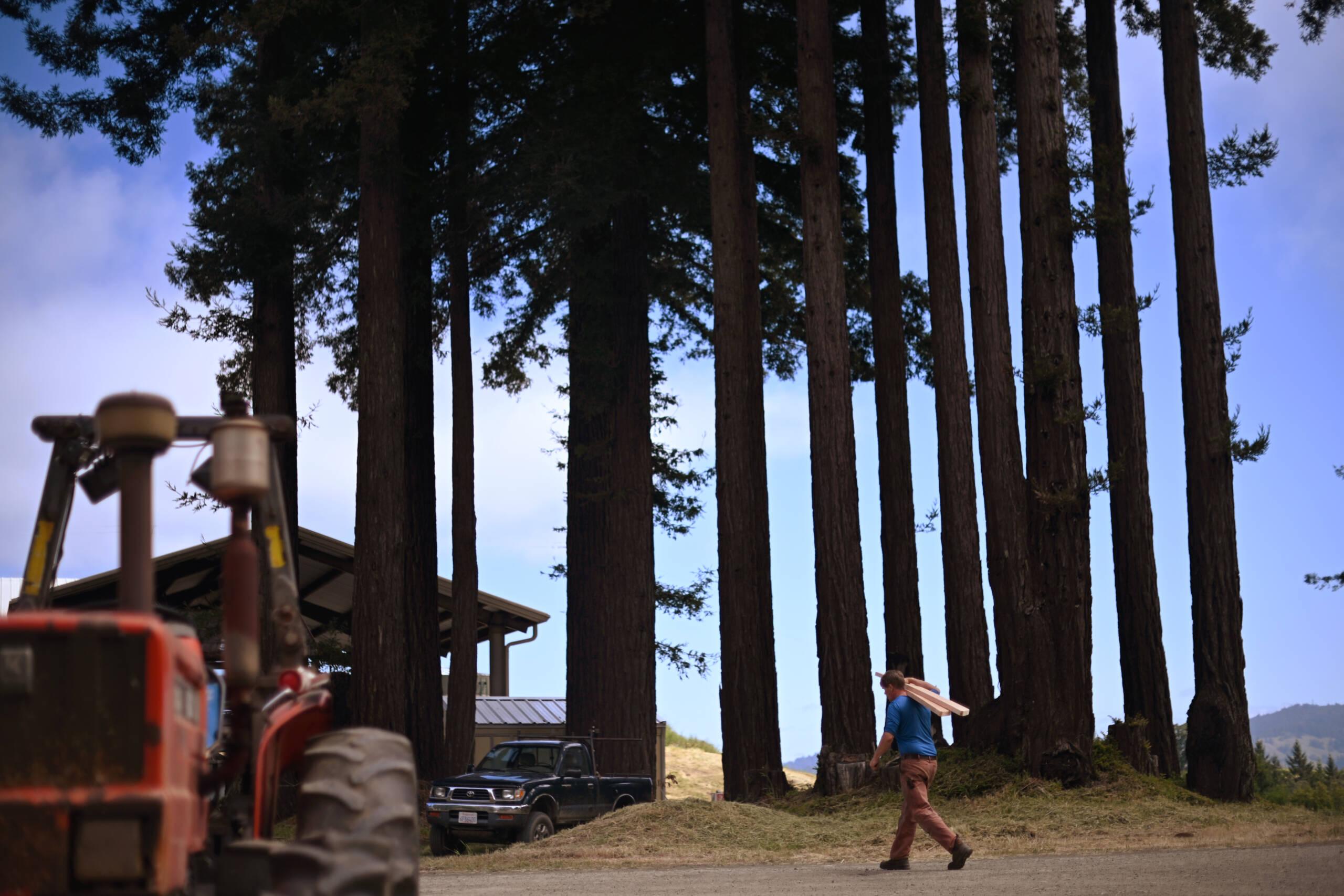By Joel Kellum, Hirsch Farm Manager, February 2025
I was born in Maine and grew up outside of Chicago. I spent most of my life farming in the Midwest. I’ve been farming organically since 1996 and I’ve worked for Hirsch Vineyards as the Farm Manager for 7 years now. I live steps away from the winery. I live with my wife, Kelly, and our son, MacGyver, who was born out at the vineyard a little over 2 years ago. I manage the Biodynamics on the ranch and steward the gardens, olive groves and fruit orchards.
In a nutshell, Biodynamics is a holistic view of farming that considers all unique habitats that are in play. Biodynamics has been around for 100 years. Hirsch began practicing in 2011. The conversion was complete in 2014.
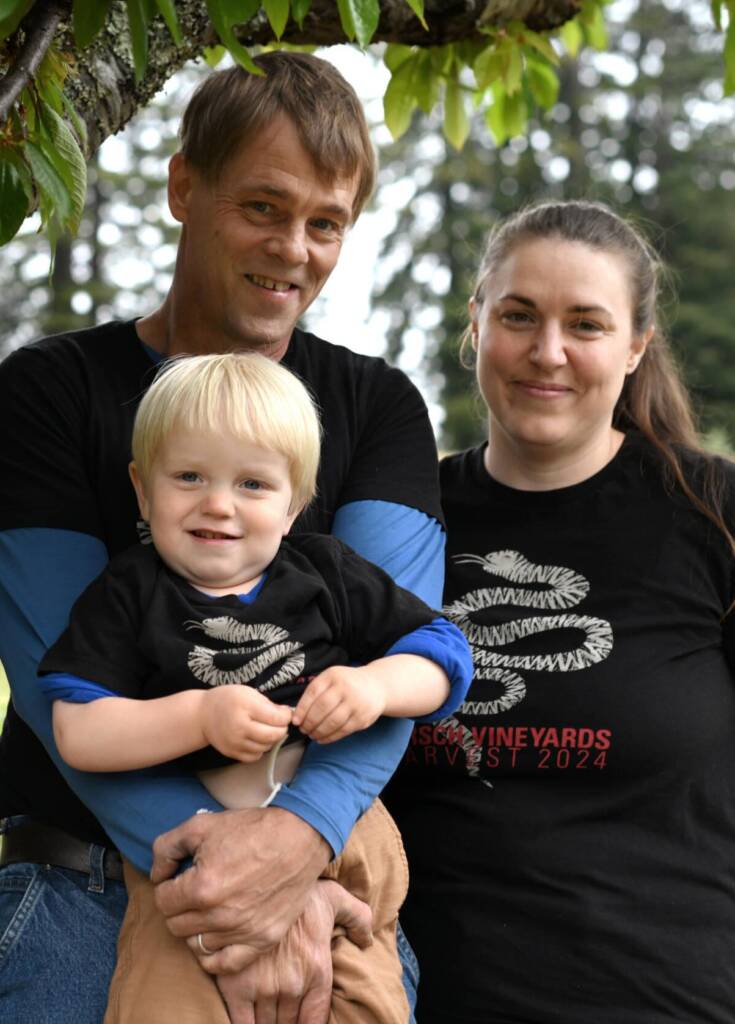
David’s vision for the ranch is that the Hirsch community, us workers, are held and healed by the land. This is accomplished through our engagement in care of the land, the plants and the people. By practicing Biodynamics, we can provide a soft landing for our ecosystem to grow and thrive. When we treat the land as a whole organism, we have healthier soils, prolific pollinator presence and we promote the vitality of our surrounding forests and watersheds.
Biodynamics gives us tools to help orchestrate this complex farming site. With compost building, creating preparations and special sprays and stirring and spreading them around the ranch, all along following nature’s moon cycles and rhythms. Compost is the gift that keeps on giving and every year we build piles that we give back to the vineyards and gardens to enhance the soils, increase organic matter, and reduce erosion.
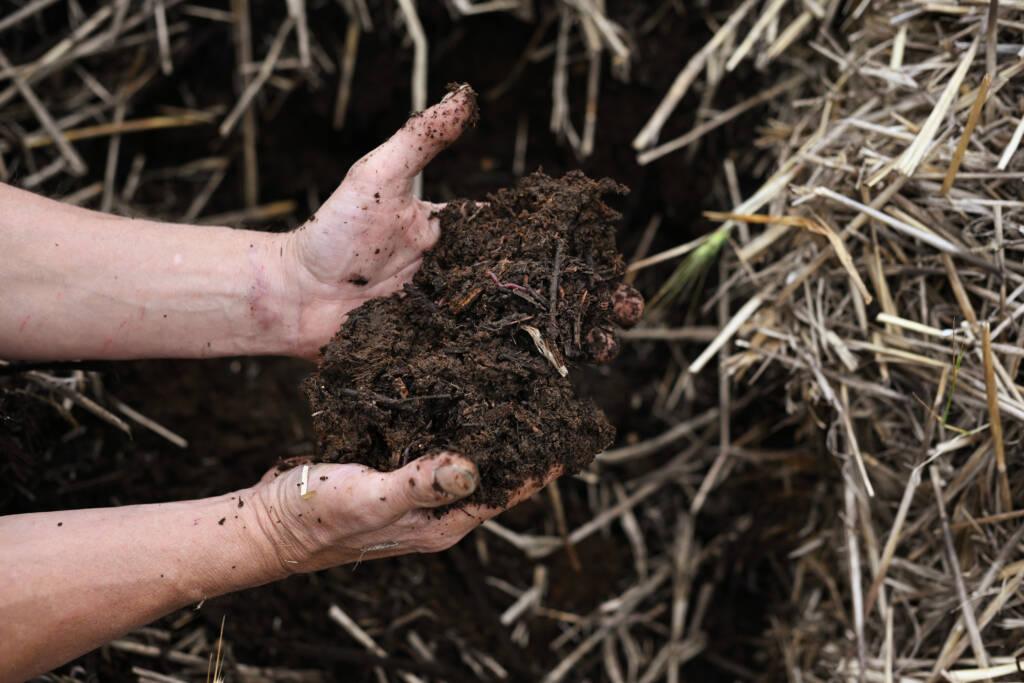
Maybe you have heard of the notorious cow manure we stuff into a cow horn, bury underground, dig back up, then add a tiny amount of it to rainwater that gets stirred vigorously and intentionally for 1 hour at a time in a wine barrel, then is sprinkled on the soil. Sounds absurd, right? But the idea is that this meditation and exercise invites the chaos of the universe and breaks it up into molecules of life forces that are given to the vineyard, all along opening up pathways for rich and desirable nutrients to interact with the soil.
We do a similar preparation but with silica instead of manure. Imagine taking a giant crystal–nature’s perfect creation and expert engineering with its fractal patterns—then crushing and pulverizing it down to an unrecognizable powder. Sounds counterproductive but our goal is to give that energy back to the vineyard while aiding in photosynthesis, reducing disease & heat stress and enhancing the quality of the final product.

Rituals like these hold a mirror to the complexities of the universe and the interwoven paths of all of the systems involved. Biodynamics is a spiritual level of farming and beyond. It forces you to slow down and look at nature how it wants to be seen. We also incorporate stinging nettle, horsetail and chamomile tea to support our plants health and vitality. Tea is made from our compost as well and is fertigated through the irrigation system and fed back to the vineyards.
And we do all of this following the influence of the moon cycles. If we can link ourselves to the cycles of the moon we will be more efficient and productive in our applications.
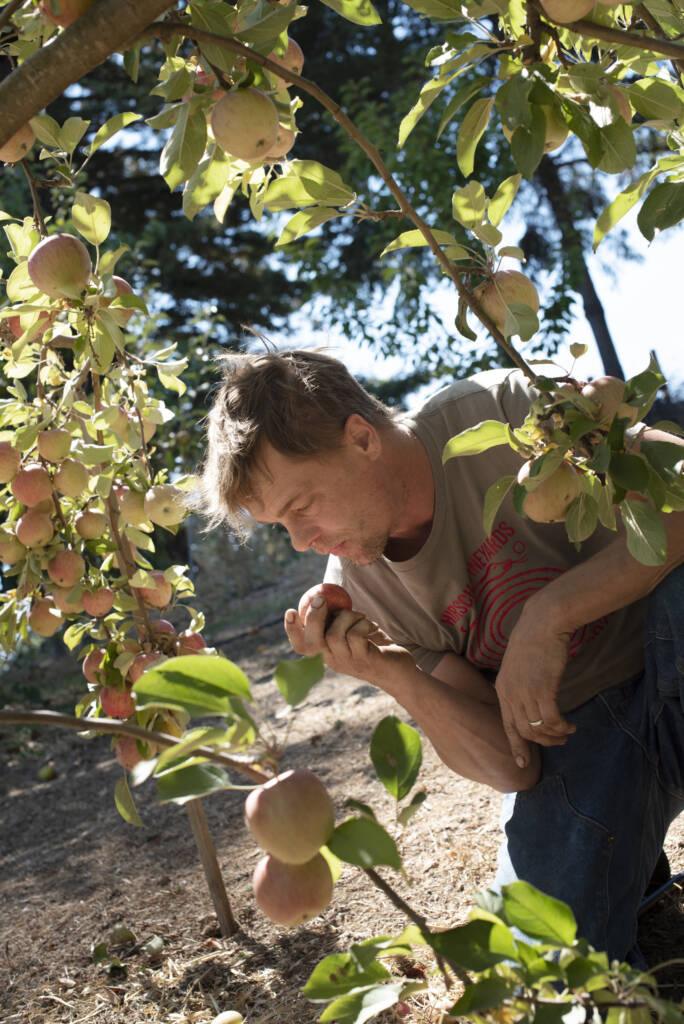
Our commitments to these practices result in outstanding crops. Farming this close to nature, will give you a wine that is closest to the place it came from. One of the many reasons Hirsch’s signature is so strong.
When you first arrive at Hirsch, you are greeted by our glorious vines. A bit further up the road, you’ll find the elusive winery. Once there, your eyes are eventually drawn to the gardens a short distance away. Being diverse in our crops promotes harmony, balance and symbiotic relationships and connection to the land.
Earlier this month, I planted 6 more citrus trees, plus 60 crowns of asparagus. We have future plans to establish a few mushroom growing logs. Often you will find Marie Hirsch in the gardens gathering produce for her and David’s next meal, or the vineyard crew picking lemons and berries after their shift. I always plant cilantro in plain sight so the men have no trouble finding it.
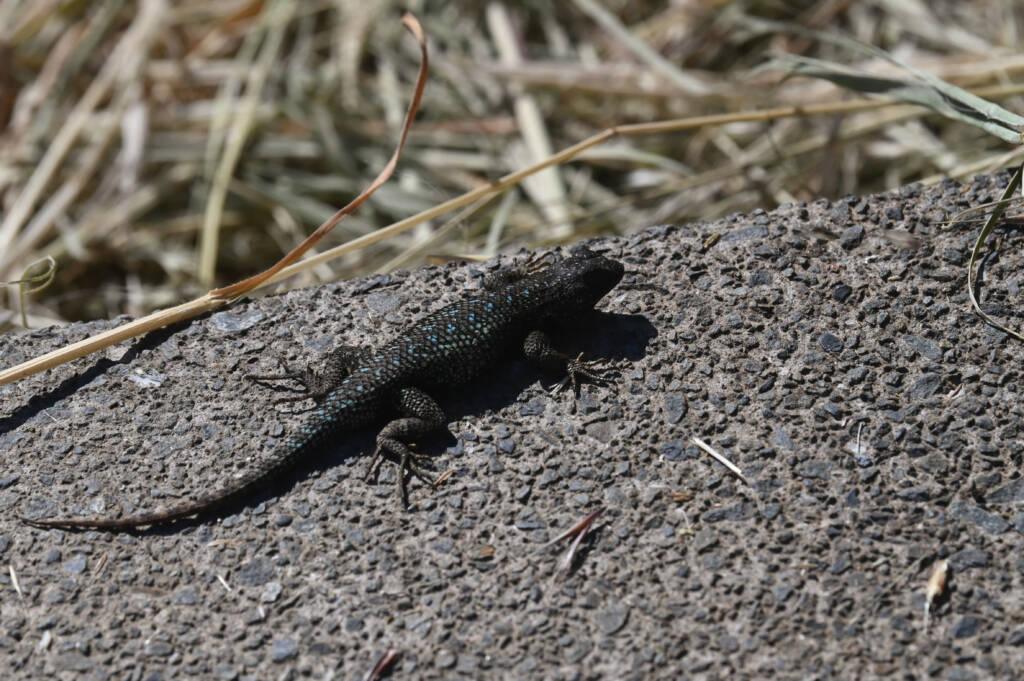
Besides the people, Alligator lizards, tree frogs, hummingbirds, orange bellied salamanders and other hidden fauna also take residence here. The gardens are reaching a point of balance now where pests, rodents and disease have fallen mostly to the wayside. The forward progress of the garden now has a voice of its own, each year, the leftover spaces and existing plants tell a story of what they want to become. I just have to listen.
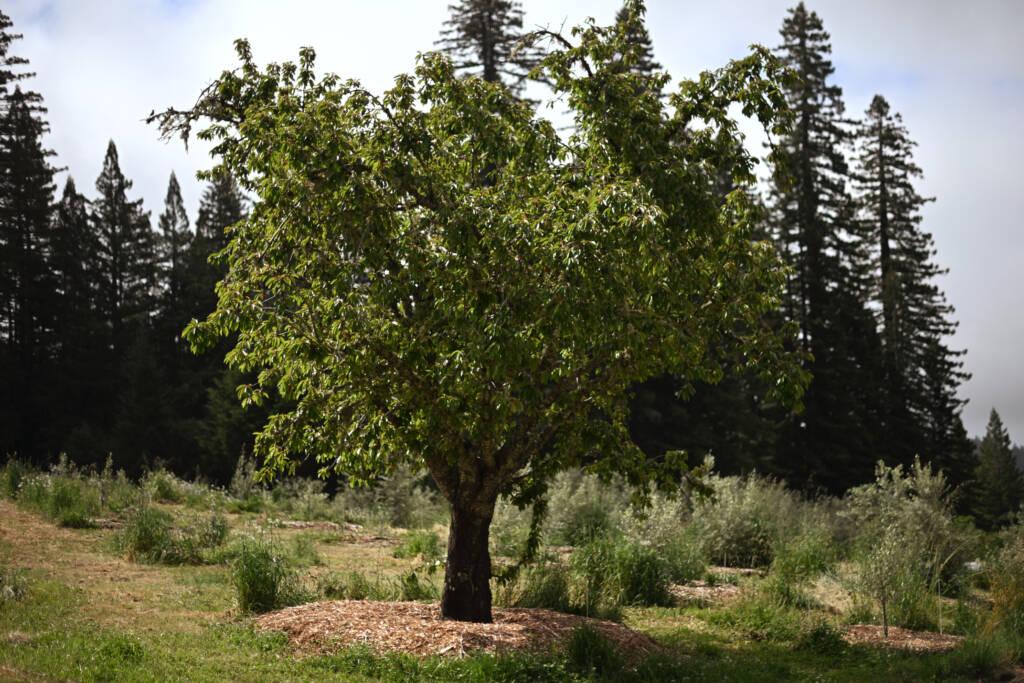
When I came to Hirsch, there were 20 olive trees. I have planted over 100 more over the last 3 years. The olive trees stand where the original ground was broken for agricultural purposes on the property. A place the pioneers 150 years ago called, “The Hill Farm.” It’s where an ancient cherry tree lives and tulips and lillies crawl the landscape leaving clues of where the homestead once could be found. I am constantly reminded of the ones who came before us as I unearth their belongings beneath the rich soil. These hidden treasures are accompanied by fertile ground, flourishing with nutrients, natural springs and a massive population of worms and other beneficials. The olive trees are mainly Frantoio and Leccino and the oil is robust and spicy with lingering notes. The olives are dry farmed and are circled in rings of compost that include long term amendments. Every year, the leftover grape pomace is also added. Then they are covered in woodchips. This allows me to dry farm the olives and manage the weed pressure in the fertile ground. Our olive oil is pressed in Sebastopol, and in the future as our yields grow, we hope to share the olive oil with our customers and beyond.
We do keep a few chickens and geese for egg production. Their coop is moveable, on wheels, in the lower orchard. I roll their coop through the rows of fruit trees so the birds have fresh ground and grass and in turn, they fertilize the pasture, inch by inch. We also currently have one honeybee hive – right in David’s backyard.

